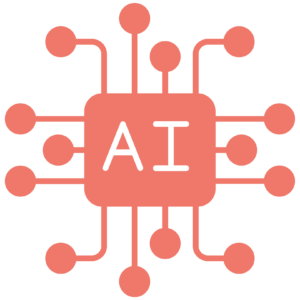Speed Read (tldr) of Practical AI Tips for School Administrators

1. Enhance Efficiency by Automating Routine Tasks: Utilize AI to streamline administrative duties such as scheduling, record-keeping, and report generation. This can save time and allow administrators to focus on strategic planning.
2. Improve Data Management and Communication: Implement Artificial Intelligence-powered chatbots and virtual assistants to manage parent and student inquiries, and analyze feedback to guide decision-making.
3. Address Challenges Like Bias and Fairness: Be vigilant about the potential for AI to perpetuate biases and ensure equitable outcomes in its recommendations.
Read below for resources, tips, and the why!
Artificial Intelligence can be incredibly helpful to school administrators by enhancing efficiency, decision-making, policy making, and overall management.
Cate Reed, seasoned administrator, current Senior Vice President of Teach For America, and Possip Reporter, share best practices and tactics for school leaders to use generative artificial intelligence tools effectively.
While it is important to keep in mind possible barriers to effectively using Artificial Intelligence, those challenges can be overcome with due diligence to ultimately help make your life as a leader easier! Note that this article only covers AI tips for school administrators, not educators or students. We’ll cover that soon and realize the depth of the conversation about digital learning, without even considering generative AI!
Jump to...
What Is Generative AI?
AI is short for Artificial Intelligence. Generative AI is a tool that creates content based on predictive modeling – in other words, it uses the language it was trained on to predict what word (or even syllable) would make sense next to answer your question or fulfill your request. To work with a generative Artificial Intelligence model, you interact with it like you would an assistant with prompts such as “Build a three day itinerary for a trip for two to Miami” or “What kinds of dishes can I make in under 30 minutes with these ingredients: x, y, z.”
If you have never worked with a large language model like Google’s Gemini or ChatGPT, use one of those prompts (or make up your own) and see what you get!
Ways AI Can Assist School Leaders
Here are several key areas where Artificial Intelligence can be beneficial in the day to day work of a school:
1. Data Management and Analysis
- Student Performance Tracking: Artificial Intelligence can analyze student performance data to identify trends, strengths, and areas needing improvement.
- Attendance Monitoring: Automated systems can track attendance, identify patterns, and alert administrators to potential issues.
2. Efficiency with AI – Tips for School Leaders
- Automating Routine Tasks: AI can automate administrative tasks such as scheduling, record-keeping, and report generation, freeing up time for administrators to focus on more strategic tasks.
- Resource Allocation: Artificial Intelligence can optimize the allocation of resources like classroom space, staff schedules, and budgeting, ensuring efficient use of school assets.
3. Communication
- Parent and Student Communication: AI-powered chatbots and virtual assistants can provide instant responses to common inquiries from parents and students, enhancing communication and engagement.
- Feedback and Surveys: Artificial Intelligence can analyze feedback from parents, students, and staff to identify areas for improvement and inform decision-making.
Here are more ideas! Bringing AI to School: Tips for School Leaders, 5 Tips for Using AI in the Classroom, and 5 Strategies for Success in Bringing AI to Schools.
AI Tips for School Administrators
Consider using Artificial Intelligence to crowdsource and draft strong school policies for your school. Here are some concrete ideas and tools:
- Text Generation Tools: Tools like OpenAI’s GPT-3 can generate coherent and contextually relevant policy drafts.
- Sample prompt: “Write a school policy for excused and unexcused absences.”
- Survey and Feedback Analysis Tools: Tools like SurveyMonkey, Qualtrics, or Possip can gather stakeholder input. Use Artificial Intelligence as a thinking partner to quickly analyze large volumes of data and start generating ideas.
- Sample prompt: “Use all these Possip parent comments from last month to generate 2-3 concrete recommendations we can implement next month.”
- Legal Research Tools: Tools like LexisNexis and Westlaw Edge, equipped with Artificial Intelligence capabilities, can ensure legal and regulatory compliance.
- Sample prompt: “Generate a list of potential risks schools face with transportation and ways to mitigate them.”
- Document Review Tools: Tools like Grammarly and Hemingway can enhance the readability, simplification and professionalism of the policy documents.
- Sample prompt: “Take this parent email and make it 50% shorter and rewrite it in Spanish at an 8th grade level.”
What Challenges Should School Administrators Expect When Using AI?
While Artificial Intelligence can offer benefits to school administrators, there are several challenges and considerations you should consider.
1. Privacy and Data Security:
Ensure all data put into AI is secured and aligned with FERPA laws.
Make sure your technology team has checked to protect any AI tools you use from cyberattacks.
2. Bias and Fairness:
AI often crowdsources answers, which can accidentally perpetuate bias. Ensure the outcomes you get feel aligned and equitable.
Before expecting students to use AI, ensure they know the rules of the road and have equitable access to the tools.
3. Transparency and Explainability:
AI won’t generate rationale on why it created a recommendation or idea unless you ask it to.
Be sure you agree with what is generated and can stand behind it with your school community.
By using artificial intelligence capabilities, and considering challenges, school administrators can harness the power of AI. It is also critical to minimize risks to ensure positive outcomes for kids and families. With all the time you and your teachers save, you could teach other practical life skills!



